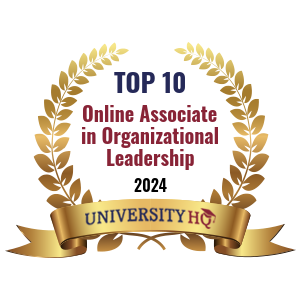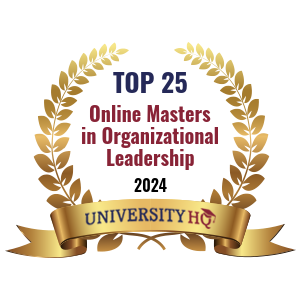What is Organizational Leadership?
Organizational leadership is the practice of guiding and directing a group of individuals toward achieving a common goal. It involves skills such as effective communication, strategic planning, decision-making, and fostering teamwork. Professionals in this field are responsible for leading teams, managing projects, and driving organizational success.
North Carolina, known for its diverse economy and strong business presence, provides an ideal setting for emerging organizational leaders to explore their talents. Home to an abundance of industries like technology, healthcare, finance, and manufacturing; each presents ample opportunity for professionals looking to make an impactful mark within their respective organizations by applying their leadership abilities effectively.
According to the US Bureau of Labor Statistics (BLS), as of May 2020, there were approximately 43,980 management occupations in North Carolina. While this data includes various management roles, it provides an overview of the employment landscape for organizational leadership professionals in the state.
There are also many options for those who are interested in working in a management position in the state; for instance, marketing managers. The BLS reported around 2,430 marketing managers working in the state. These professionals are responsible for developing marketing strategies, managing advertising campaigns, and analyzing market trends. North Carolina also employs roughly 3,730 human resources managers - who play an essential role in recruiting and hiring staff members, managing employee benefits packages, and resolving workplace conflicts.
Overall, the employment statistics reflect a healthy demand for organizational leadership professionals in North Carolina. The diverse range of industries and the presence of well-established businesses in the state contribute to a robust job market for individuals with leadership skills and expertise.
Students interested in learning about organizational growth and group dynamics in relation to business administration can complete a degree in the institution of their choice across the state. Their options might include North Carolina wesleyan college, North Carolina State University, the University of North Carolina, and more. Coursework might cover concepts such as the implementation of change, business administration, public policy, business writing, and various elective courses. Both new and adult students can find a program that works for them.

Featured Online Programs
Online Organizational Leadership Education in North Carolina
An organizational leader is an individual who is responsible for guiding and influencing others toward achieving a common goal within an organization. Leadership roles are crucial for the success and growth of any company, as it sets the direction and motivates team members to work toward a shared vision.
Organizational leaders possess a special set of abilities and qualities that enable them to effectively lead and manage their teams. These include effective communication, decision-making abilities, problem-solving abilities, and inspiring and motivating others. Furthermore, organizational leaders possess a deep knowledge of their organization's goals, values, objectives, enabling them to better align their efforts with them and the overall mission.
An organizational leader's primary responsibility is to foster an atmosphere in the workplace in which employees feel appreciated and motivated, encouraging collaboration, teamwork, and sharing of ideas and opinions. They often achieve this by building trusting relationships among their subordinates, which increases productivity and engagement levels overall. Leadership professionals play a critical role in setting the strategic direction of an organization. As such, they must make important decisions that shape overall company success; this may include analyzing market trends, identifying growth opportunities, and devising plans to meet long-term objectives. Leaders often collaborate with other stakeholders, such as executives and department heads, to ensure alignment and coordination across different areas of an enterprise.
Furthermore, organizational leaders are responsible for identifying and developing future leaders within the organization. They mentor and coach employees, providing guidance, and support to help them reach their full potential. By investing in the growth and development of their team members, leaders create a pipeline of skilled individuals who can contribute to the organization's success in the long run.
Online Associates (AS)

The popularity of associate degrees in business or leadership is on the rise, and for good reason. These degree programs offer a unique curriculum that combines both theory and practical skills to prepare students for leadership positions in a variety of organizations. What sets these programs apart from others is their focus on developing strong communication, critical thinking, and problem-solving skills – attributes that are highly valued in today's fast-paced business world.
One key advantage of pursuing an associate degree in organizational leadership is the flexibility it provides. Unlike traditional four-year programs, this shorter-term option allows students to enter the workforce sooner while still gaining valuable knowledge and skills. Additionally, many associate degree programs offer flexible scheduling options, such as evening or online classes, making it easier for working professionals to balance their studies with other commitments.
Moreover, an associate degree in this field can open doors to a wide range of career opportunities. Graduates may find themselves pursuing roles as team leaders, project managers, supervisors, or even small business owners. The critical thinking and problem-solving abilities developed through these programs make graduates highly adaptable and capable of handling various challenges within dynamic work environments.
Online Bachelors (BS)

A bachelor's degree in organizational leadership is not just another piece of paper. It is an empowering qualification that equips individuals with the essential skills and knowledge to navigate the complex dynamics of modern workplaces. These programs are designed to cultivate effective leaders who can drive positive change, streamline operations, and maximize productivity within any organization.
What sets these degrees apart from traditional business programs is their emphasis on developing strong interpersonal and communication skills. These graduates are trained to effectively communicate their vision, motivate teams, and build relationships based on trust and respect. These skills are invaluable in today's rapidly changing workplace, where collaboration and teamwork are central to success.
Moreover, a bachelor's degree in this field also equips graduates with a deep understanding of employee behavior and motivation. This insight allows leaders to create a conducive work environment that fosters engaged employees who are committed to achieving the organization's goals.
Find Your Online Organizational Leadership Program
Online Masters (MS)

Organizational leadership is a vital field in today's fast-paced corporate world. Companies are constantly searching for skilled professionals who can effectively lead teams, navigate complex challenges, and drive innovation. A master's degree in organizational leadership equips individuals with the necessary skills and knowledge to make a significant impact within any organization.
One of the key benefits of pursuing a master's degree in organizational leadership is the opportunity to develop crucial leadership qualities. These programs provide an immersive learning experience that combines theoretical knowledge with practical exposure. Students are exposed to real-world scenarios, allowing them to apply their newfound skills immediately. Through case studies, group projects, and internships - students learn how to effectively communicate and motivate their team members to achieve common goals.
Furthermore, a master's degree in this field offers numerous opportunities for networking and collaboration. These programs often attract professionals from diverse backgrounds and industries, providing students with a dynamic learning environment. Engaging with peers through discussions and group activities allows for the exchange of ideas and perspectives that ultimately foster innovative thinking. These connections can prove invaluable throughout one's career as they provide access to mentorship opportunities, potential partnerships, or job referrals.
Online Doctorate (PhD)
The most advanced degree in the field of leadership is a PhD. These degrees provide individuals with the knowledge and skills to lead and manage organizations effectively. It goes beyond traditional management theories and explores new ideas, research, and practices that can transform organizational culture. A PhD in organizational leadership equips students with critical thinking skills, research capabilities, and a deep understanding of human behavior within complex organizational systems.
Some leadership programs will focus only on developing technical skills or strategic thinking, while others take a holistic approach to leadership development. They can combine the study of leadership theory with an exploration of applied research methodologies, allowing students to analyze real-world organizational challenges from multiple perspectives. This multidisciplinary approach ensures that graduates are well-equipped to navigate complex environments, adapt to changing circumstances, and inspire others to achieve their full potential.
A PhD in organizational leadership provides access to diverse career opportunities for individuals passionate about driving change within organizations. Graduates can pursue careers as consultants, executive leaders, educators, or researchers in both private and public sectors. You might even be able to work as an associate professor and eventually gain tenure. With their extensive knowledge of leadership principles and best practices gleaned from years of rigorous study and research, these professionals are well-positioned to make meaningful contributions toward improving organizational outcomes – be it increased profitability or enhanced employee engagement.
Online Certifications
Organizational leadership certifications have become increasingly popular and valuable in today's competitive job market. These credentials not only enhance an individual's knowledge and skills in leadership, but also demonstrate their commitment to professional development. Moreover, having a recognized certification in organizational leadership can open doors to new career opportunities and increase earning potential.
One of the unique aspects of organizational leadership certifications is that they focus on developing well-rounded leaders who possess both technical expertise and strong interpersonal skills. These programs typically cover a wide range of topics including strategic thinking, team building, conflict resolution, change management, and ethical decision-making. This comprehensive approach helps individuals develop the ability to navigate complex organizational dynamics while inspiring and empowering others.
In addition to the practical benefits, pursuing an organizational leadership certification can also be personally fulfilling. It provides individuals with a sense of accomplishment and validation of their expertise in leading teams effectively. Furthermore, these certifications often involve networking opportunities with like-minded professionals from diverse industries. The chance to exchange ideas and learn from others' experiences can be invaluable for personal growth, as well as future career prospects.
Become a Leader in North Carolina
North Carolina is a state known for its rich history, diverse culture, and vibrant economy. It offers numerous opportunities for individuals to thrive and become leaders in their chosen fields. If you aspire to be a leader in North Carolina, here are some steps you can take to achieve your goal.
-
Step 1: Set clear goals
The first step to becoming an effective leader is setting clear goals and outlining a path you want to travel. Having a clear vision provides direction and motivation.
-
Step 2: Build your knowledge and skills
Leaders must constantly expand and hone their abilities, so make the most of educational opportunities in North Carolina like workshops, seminars, and conferences related to your field of interest. Furthermore, consider further education or professional training programs designed to deepen your knowledge.
-
Step 3: Seek out mentors
Finding mentors who have achieved success in your desired field can be invaluable. They can offer guidance, share their experiences, and offer insights that will assist you in navigating your own path toward leadership. Look out for networking events or professional organizations where experienced people may serve as potential mentors.
-
Step 4: Develop effective communication skills
Communication is one of the cornerstones of effective leadership, so work on honing both verbal and written communication, as well as attentive listening skills to become an exceptional leader. Effective leaders know how to articulate their ideas clearly while inspiring others while forging lasting relationships.
Find Online Organizational Leadership Programs
What Can I Do with a Bachelor's in Organizational Leadership?
A bachelor's degree in organizational leadership can open you up to a world of exciting career opportunities. One popular path is to become a human resources manager or specialist. With strong interpersonal skills and a deep understanding of organizational behavior, you can effectively recruit, train, and retain top talent for companies across industries. Additionally, as organizations increasingly prioritize diversity and inclusion efforts, your expertise in leading teams and fostering inclusive work environments will be highly sought after.
Another promising career option with this degree is management consulting. As a consultant, you will use your knowledge of organizational dynamics to help businesses improve their efficiency, productivity, and profitability. You'll analyze the company's operations, identify areas for improvement, and develop strategies to implement positive change. With excellent problem-solving skills and the ability to adapt quickly to different industries and contexts, your impact as a consultant can be far-reaching.
Moreover, with a bachelor's in organizational leadership, you also have the opportunity to pursue entrepreneurial ventures. Equipped with knowledge in effective teamwork and communication styles that foster collaboration within organizations' structures can give you an advantage as an entrepreneur. Whether starting your own business or joining forces with others on innovative projects or startups—your ability to lead teams toward collective goals will be essential for success.
Potential Careers for Organizational Leadership Graduates
- HR Compensation Benefits and Job Analysis Manager:
A compensation, benefits, and job analysis manager is responsible for developing and implementing compensation and benefits strategies to attract, retain, and motivate employees. They will also conduct job analysis to evaluate the duties, responsibilities, and requirements of each job within the organization.
Necessary Requirements:
- Bachelor's degree in human resources, business administration, or a related field
- Proven experience in compensation and benefits management, including job analysis and evaluation
Estimated Salary
- The mean annual wage for compensation and benefits managers in the US in 2021 was $143,140
- The mean annual wage for compensation and benefits managers in North Carolina is $142,640
- Chief Information Officer (CIO):
A chief information officer (CIO) is a senior executive responsible for overseeing the information technology strategy and operations of an organization. This role involves managing the company's technology systems, ensuring data security and privacy, and driving innovation through digital transformation initiatives. The CIO collaborates with other business leaders to align technology initiatives with organizational goals, ensuring that technology solutions support business objectives and drive competitive advantage.
Necessary Requirements:
- Bachelor's degree in computer science, information technology, or a related field
- Proven experience in a senior leadership role within IT or technology management
- Strong strategic thinking and problem-solving skills
Estimated Salary
- The median annual wage for computer and information systems managers in the US in 2021 was $159,010, though the average top executives earned $189,520
- The mean annual wage for computer and information systems managers in North Carolina is $158,140, though the average top executives earn $322,120
- School Education Administrator:
Education administrators are charged with overseeing and managing educational institutions such as schools, colleges, or universities. They work in close collaboration with faculty members, staff members, students, and parents to ensure smooth functioning.
Necessary Requirements:
- Bachelor's or Master's degree in education administration or a related field
- Proven experience in educational leadership or administration
- Strong organizational and communication skills
Estimated Salary
- The mean annual wage for education administrators (kindergarten through secondary) in the US in 2021 was $106,690, while education administrators for postsecondary earned $115,180
- The mean annual wage for education administrators (kindergarten through secondary) in North Carolina is $79,850, while education administrators for postsecondary earn $104,260
- Non-Profit Executive Director:
Non-profit executive directors are accountable for overseeing and managing all operations, programs, and resources of a non-profit organization. Working closely with its board of directors, they must develop and implement its strategic plan while simultaneously assuring financial sustainability and fulfilling its mission.
Necessary Requirements:
- Bachelor's degree in a related field (master's degree preferred)
- Proven experience in non-profit management or executive leadership role
Estimated Salary
- The mean annual wage for fundraising managers in the US in 2021 was $124,450
- The mean annual wage for fundraising managers in North Carolina is $103,260
- Information Technology Manager:
A technology or IT director is responsible for overseeing and managing all aspects of an organization's technological infrastructure and systems, while aligning technology strategies with overall business objectives. They will lead a team of IT professionals and work closely with other departments to ensure smooth operations and efficient use of technological resources.
Necessary Requirements:
- Bachelor's degree in computer science, information technology, or a related field
Estimated Salary
- The median annual wage for computer and information systems managers in the US in 2021 was $159,010
- The mean annual wage for computer and information systems managers in North Carolina is $158,140
- Marketing Manager:
Marketing managers of any organization are charged with overseeing and implementing its marketing strategies to build brand recognition, generate leads, and increase sales. Working closely with their sales team, they must devise successful campaigns and initiatives aligned with company goals and objectives.
Necessary Requirements:
- Bachelor's degree in marketing, business administration, or a related field
- Proven experience as a marketing manager or a similar role
- Strong knowledge of digital marketing strategies and techniques
- Proficient in using marketing software tools such as google analytics, CRM systems, and email marketing platforms
- Excellent communication and interpersonal skills
Estimated Salary
- The mean annual wage for marketing managers in the US in 2021 was $158,280
- The mean annual wage for marketing managers in North Carolina is $144,790
- Human Resources Manager:
A human resources manager is responsible for overseeing all aspects of the human resources functions within the organization. This includes managing recruitment and onboarding processes, employee relations, performance management, training and development, compensation and benefits, and ensuring compliance with employment laws and regulations. This manager plays a crucial role in creating a positive work environment and fostering employee engagement and satisfaction.
Necessary Requirements:
- Bachelor's degree in human resources or a related field
- Proven experience in a human resources managerial role
Estimated Salary
- The median annual wage for human resources managers in the US in 2021 was $126,230
- The mean annual wage for human resources managers in North Carolina is $134,090
- Project Coordinator:
A supply chain manager logistician is responsible for overseeing all aspects of supply chain operations: procurement, transportation, inventory management, distribution, etc. They collaborate closely with suppliers, manufacturers, and customers to ensure timely and efficient product deliveries. Furthermore, this individual analyzes data trends in order to optimize operations and cut costs.
Necessary Requirements:
- Bachelor's degree in supply chain management, logistics, or a related field
- Proven experience in supply chain management or logistics role
- Strong knowledge of procurement, transportation, inventory management, and distribution processes
- Proficiency in using supply chain management software and tools
- Excellent analytical skills with the ability to interpret data and make informed decisions
- Strong communication and negotiation skills
Estimated Salary
- The median annual wage for logisticians in the US in 2021 was $77,030
- The mean annual wage for logisticians in North Carolina is $74,400
